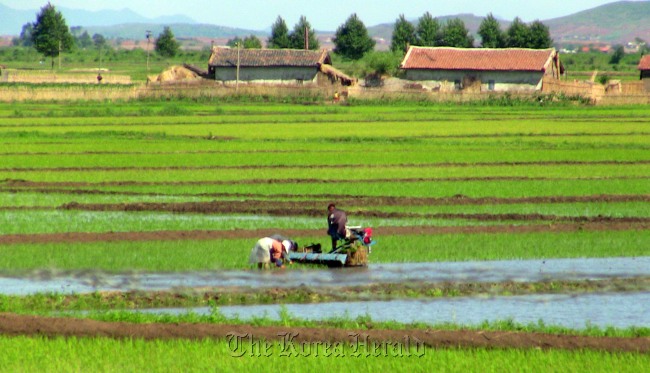Speculation about suspension of N.K.-China industrial belt
By Shin Hyon-heePublished : July 30, 2012 - 20:30
Speculation is rising over a possible suspension of a joint project between North Korea and China to build an industrial belt along their border.
Citing a source within the North Korean military, Japan’s Asahi Shimbun newspaper on Sunday reported that China declared a moratorium on the Hwanggeumpyeong economic zone development program last month after Pyongyang insisted on maintaining its troops on the border island to safeguard its interests there.
Local farmers reportedly said that a small waterway in the area that had been reclaimed to facilitate construction has been returned to its original state this month.
Other observers said that the North is expected to have demanded Chinese funding for its roads, sewers and other infrastructure, while investors apparently prefer to remain “passive” due to worries about the host country’s volatile policies.
Citing a source within the North Korean military, Japan’s Asahi Shimbun newspaper on Sunday reported that China declared a moratorium on the Hwanggeumpyeong economic zone development program last month after Pyongyang insisted on maintaining its troops on the border island to safeguard its interests there.
Local farmers reportedly said that a small waterway in the area that had been reclaimed to facilitate construction has been returned to its original state this month.
Other observers said that the North is expected to have demanded Chinese funding for its roads, sewers and other infrastructure, while investors apparently prefer to remain “passive” due to worries about the host country’s volatile policies.

A similar controversy broke out late last month after Beijing was reported to have sought to suspend the much-touted program as Pyongyang’s failed rocket launch in April eroded its feasibility and investment prospects.
Chinese officials dismissed the claims at the time, calling them “groundless and irresponsible.”
“China and North Korea enjoy sound business cooperation. The projects of the two economic zones in Hwanggeumpyeong and Rason are progressing steadily,” Foreign Ministry spokesperson Hong Lei told journalists on June 27.
Another Chinese official said that a new large bridge under construction since May would be completed in 2014 as planned.
The project was initiated in the late 2000s as part of the two communist countries’ drive to cultivate border towns including Hwanggeumpyeong, which handles about 70 percent of shipments in and out of the two countries.
Under the plan, Beijing is currently building and renovating roads, railways, ports and other facilities in the region at its expense. Pyongyang, for its part, is believed to have offered development, access and mining licenses.
Since November, China has been providing training and tours to its own economic zones for about 100 North Korean economic bureaucrats and academics in charge of cultivating Najin-Sonbong and Hwanggeumpyeong.
The initiative came in line with sharply growing trade and investment between the two allies, prompted by Pyongyang’s deepening isolation.
It is unclear whether the project is seeing a delay or shift in direction, and, if so, whether the reason is political or economic. But if it proves true, their longstanding relations could take a hit, observers say.
“Maybe Chinese willingness to foot the training bill was prompted by their experience in negotiating accords for the Hwanggeumpyeong and Wihwa Islands project,” Stephan Haggard, director of the Korea-Pacific Program at the University of California, San Diego, wrote on the blog of the Peterson Institute for International Economics.
In his survey released early this month on more than 300 Chinese enterprises that are doing or have done business in the isolated country, a majority of respondents said they were unhappy about the North Korean institutions, regulations and corruption.
While a slight majority believes that it is getting easier to do business in North Korea, they “generally have a negative assessment of the business environment,” said the survey conducted together with Marcus Noland, a deputy director of the Washington-based think tank.
About 86 percent of the respondents identify the ban on cell phones and 79 percent picked inadequate infrastructure as constraints, they found.
Around 79 percent and 70 percent cited changing regulations and the nature of regulations as a major hindrance, respectively. Just over 60 percent reported that it is impossible to do business outside the special economic zones and that there is expropriation risk.
“In response these firms have adopted various strategies to reduce risk, including limiting their activity to trading and to exporting in particular, these transactions involve less exposure to North Korea and can even be undertaken in China,” they said in the report.
By Shin Hyon-hee (heeshin@heraldcorp.com)











![[Today’s K-pop] BTS pop-up event to come to Seoul](http://res.heraldm.com/phpwas/restmb_idxmake.php?idx=644&simg=/content/image/2024/04/17/20240417050734_0.jpg&u=)




![[KH Explains] Hyundai's full hybrid edge to pay off amid slow transition to pure EVs](http://res.heraldm.com/phpwas/restmb_idxmake.php?idx=652&simg=/content/image/2024/04/18/20240418050645_0.jpg&u=20240419100350)

![[Today’s K-pop] Zico drops snippet of collaboration with Jennie](http://res.heraldm.com/phpwas/restmb_idxmake.php?idx=642&simg=/content/image/2024/04/18/20240418050702_0.jpg&u=)